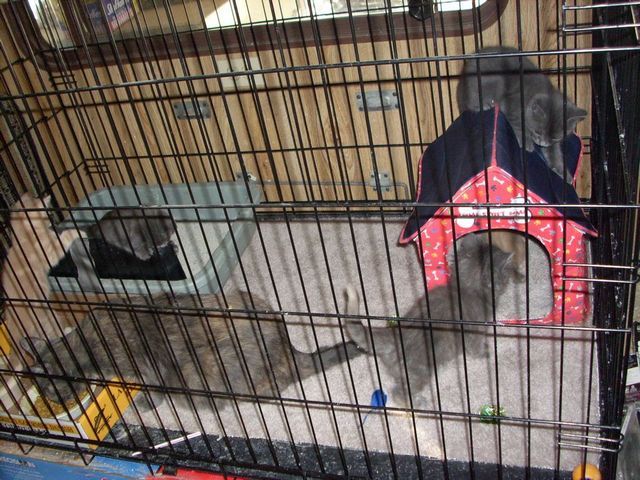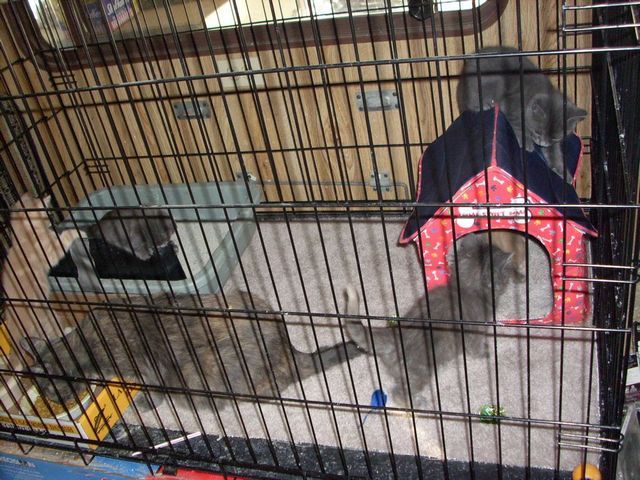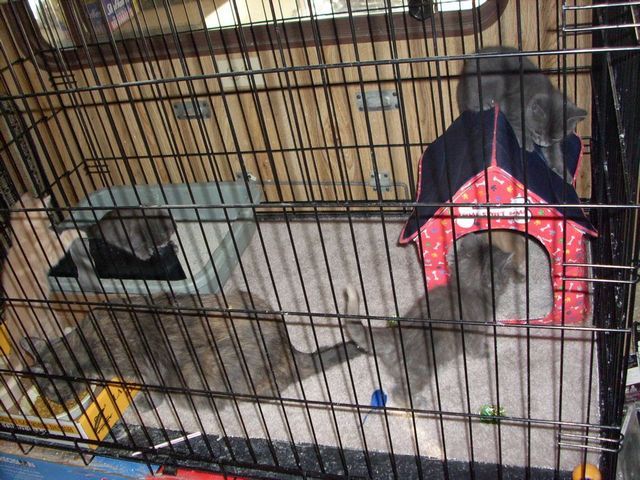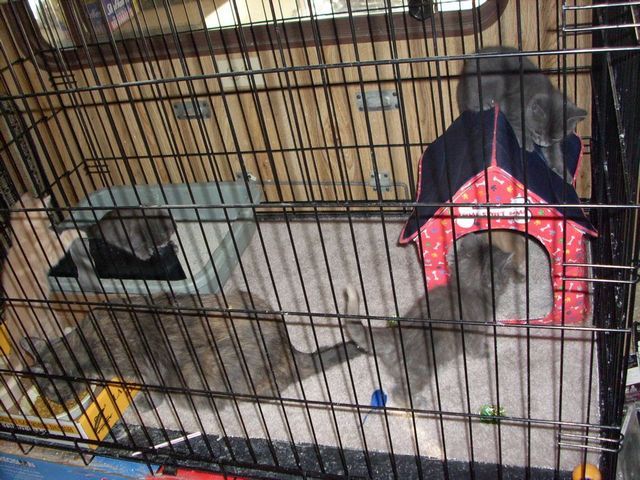QuestionQUESTION: Last night, I was feeding my two cats. One is about four or five and the other is one and a half. They've been living together for over a year now without any problem. I left the room and heard banging and screaming and when I reentered, the older cat was basically trying to kill the younger one. She bit her tail until it bled and went for her throat, but I got them apart in time. They have lived harmoniously up to this point; neither one is spayed and they are both indoor cats without contact with other cats. It's been seven hours and I still have to keep them separated. It is strange because the younger one is typically the aggressive cat and now she is being very passive - I think she is scared to death. The older cat is perfectly normal around me, but if she even catches sight of the younger one she becomes violent. Any ideas what I can do to fix the situation?
ANSWER: Celina,
The first thing I would do is get them spayed if can afford to! The older cat may have smelled the younger cat going into heat and reacted to that. And, a cat goes by smell and not by sight in identifying another cat. If the younger cat suddenly smelled different the it is possible that she thought there was suddenly a 'new' cat in the home and is defending her territory. Spaying cures a lot of behavior and emotional problems!
What also may be happening is a behavior called Redirected Aggression. That happens when a cat sees a strange cat outside and becomes territorial, but can't get to the strange cat to defend her territory. The cat then turns on the closest animal member of the family and fights with them as if they were the other cat. They have been known to attack other family cats, even though they may have lived and gotten along together (as yours is doing), the family dog, and even their owners if no other pets are in the household (though that is rare). They are not attacking the other cat in their minds...they are attacking the strange cat. It is also common that they can begin 'spraying' and defecating outside the litterbox due to the stress of the cat outside.
First thing you need to do is block the window past the cat's eye level of the window that they can possibly see another cat out of (out of sight, out of mind). If it is allowed to go on the cats may develop a permanent personality change.
If you can, keep the cats away from each other for awhile unless you are feeding them yummy cat treats TOGETHER, like tuna, tinned sardines in oil, etc. That is so they will associate something pleasant (cat treats) with each other and not unpleasant (the strange cat).
There is a very popular cat calming spray and plug-in you can use called Feliway (or Comfort Zone with Feliway). It is available at pet stores, vet's offices (they use it too), or on-line. It copies relaxing pheromones that cats produce from rubbing their faces on things.
There is also an EXCELLENT calming product that you can add to the cat's food or water that reduces anxiety, stress, and aggression called Bach's Rescue Remedy. It is available on-line and in health food stores. Here is a link about it: (copy and paste, or type the whole links into your address bar)
http://www.bachflower.com/Pets.htm
If the cats are still being very stressed the vet can put them on "kitty Prozac" for a short term (usually 2 weeks) until they calm down. You may want to speak to the vet about it.
Something to be aware of too is that pain can cause aggression. Ear infections, bite wounds, and abscessed teeth can cause a cat to become aggressive. When a cat has a noticeable change in behavior or becomes aggressive you should have the cat examined by a vet to rule out the possibility of a medical issue before dealing with it as a behavioral problem.
Tabbi
---------- FOLLOW-UP ----------
QUESTION: Hi again,
Your information was really helpful, but I just realized I left out a really important factor: I moved about two weeks ago to a new house. When we first arrived, the younger cat was excited and exploring and the older one was very skittish and hid for a while. She got better after the first week, but I figured that the stress may have built up and is finally being manifested in this aggressive behavior. Does this info have any affect on your advice? (I am going to try some of the food additive you mentioned -- it will at least help her nervousness resulting from the move.)
AnswerCelina,
The older the cat the harder new adjustments are to make. And they don't take stress as well as a younger cat.
First, I would keep her confined to your room for up to 2 weeks to let her acclimate to her new surroundings and give her a chance to calm down. Feed and water her, and keep a litterbox in there temporarily while she is confined. Preferably get a kitty condo/cat tree so she can look out the window and get used to the new noises and smells of the home and surrounding area. Then gradually expand her area. Let her go into one other room at the time. Letting her loose in a new, big area is too overwhelming and confusing all at once. Let the other cat into the room and she how she behaves. She may welcome the other cat as something 'familiar' if she is not stressed so bad. Also put her favorite bed, blanket, toys or any item that is familiar to her in the room. The smells of "home" will help her adjust to their new surroundings.
Cats do not have any reasoning abilities to understand new home/new territory. Pick her up and walk her outside to show her things are different. If an indoor cat accidentally gets outside or if you move to a new location with your outdoor cat, it is very common that they will become lost - even if they are only 10 feet away from home if they have not had the opportunity to scent mark their outdoor territory. Sometime soon, make sure the cat checks out the outside area of the new home so she can put her scent on things (like bushes, etc.) so she knows where she lives. You may want to collar train her, then tape your address and/or phone number on the collar in case she accidently gets out and gets disoriented. Keep a collar tight at first so she can't get her jaw under it which can cause a broken jaw if she panics if she gets it in her mouth. Loosen it when she has adapted to it, 2 fingers-loose under the collar.
I hope this additional information is helpful.
Tabbi

 Neutred female with 6 moth non-neut male
QuestionOur female cat love our other white male, both
Neutred female with 6 moth non-neut male
QuestionOur female cat love our other white male, both
 Introducing a new male cat to another male cat
QuestionI have just bought a male British Shorthair and
Introducing a new male cat to another male cat
QuestionI have just bought a male British Shorthair and
 tabby aggressive
QuestionHi,my male cat jasper is 7 years of age and has
tabby aggressive
QuestionHi,my male cat jasper is 7 years of age and has
 Aggressive new cat
QuestionDear Tabbi,
We have rescued many c
Aggressive new cat
QuestionDear Tabbi,
We have rescued many c
 Assimilating a disabled cat into our home
QuestionDear Tabbi,
My husband and I share our home wit
Assimilating a disabled cat into our home
QuestionDear Tabbi,
My husband and I share our home wit